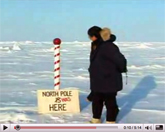Women at some environmentally conscious nonprofits are indignant that a new group overseeing financing for a United Nations climate change effort has 19 members — none of them women.
The group’s task is to allocate funds to developing countries to help mitigate the impact of climate change.
“It includes equal representation between industrialized countries and developing countries,” Elizabeth Becker, a member of Oxfam America, and Suzanne Ehlers, president of Population Action International, wrote in a joint blog post on Grist. “But what it does not include at all is women.”
The group’s members were appointed by the United Nations secretary general, Ban Ki-moon, after consultation with governments, said Dan Shepard, a United Nations spokesman. It will be led by two prime ministers, Gordon Brown of Britain and Meles Zenawi of Ethiopia.
The blog post argues that as primary providers of food, water and fuel in developing countries, women are significantly affected by climate change.
Furthermore, Ms. Ehlers said, women are critical to family planning. Population growth is considered a major factor in the warming of the planet.
“Family planning is not the silver bullet for climate change, but it is an easy, cost-effective intervention,” she said.
Women do in fact lead several major United Nations operations, including the World Health Organization, the United Nations Children’s Fund and the United Nations Development Program.
For some important agencies, “it’s clear that the secretary has been able to look very broadly at who’s best for the job,” Ms. Ehlers said.
Population Action International is working with other nonprofit groups to draft a letter to Mr. Ki-moon requesting that women be appointed.
A update from the U.N.: France has replaced its appointee with a woman, the French finance minister, Christine Lagarde. We don’t have further details, but we’ll update if we find out more.


 Loading tweets...
Loading tweets...


 Apture allows readers to dig deeper into a subject without ever leaving the blog post. When you click on any link marked by the icons
Apture allows readers to dig deeper into a subject without ever leaving the blog post. When you click on any link marked by the icons 





